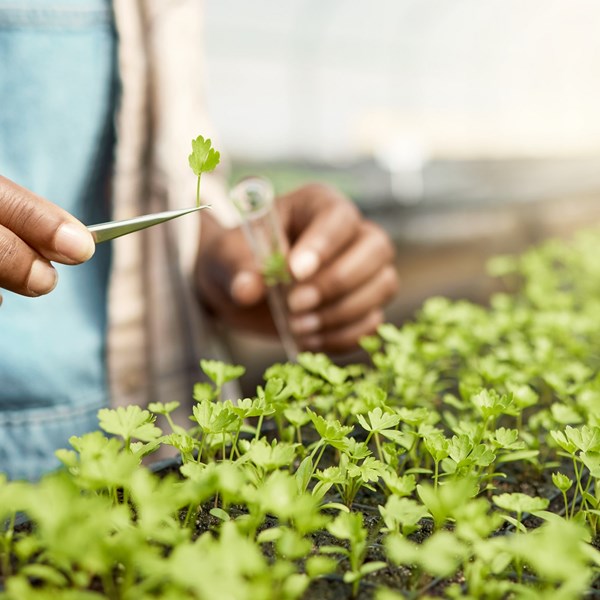As you’re participating in the Food & Bio Summit, you will have a serious interest in the biotechnical aspects of the food and drink industry.
Moreover, you will have a serious interest in the different ways we can transform our current food systems to create more sustainable ecosystems and the part both business and science will need to play in this transformation.
One of the technologies that will drive this transformation is fermentation but why?
For us Lene Jespersen ( Professor of Microbial Ecology and Food Fermentation at University of Copenhagen’s Department of Food Science) has summed it up perfectly:
Society can benefit greatly from fermentation as a path towards a more climate-friendly food system if we start researching the fermentation of plants, new raw materials and surplus vegetables.”
That’s right! Fermentation has the potential to contribute heavily to the alleviation of three of the key crises we face today - producing more food, producing more sustainable and environmentally friendly food, and producing healthier food.
Admittedly fermentation is nothing new. The producers of alcoholic beverages have of course relied on fermentation for millennia. However, while fermentation has played a huge part in food and drink production’s history, it is poised to play an even greater part in its future.
Traditional fermentation has been supplemented by advances in biomass fermentation and precision fermentation and innovation is continuing at pace. The reasons for this rapid upward trend in innovation and creativity are simple; fermentation is versatile, full of tech and well suited to working with R&D.
The trends are instantly apparent in the figures recently published in Net Zero Insights/ECBF’s ‘A deep dive into the precision fermentation venture space in Europe and Israel’:
- Investment in precision fermentation in Europe and Israel hit an all-time high in 2022 with a 160% year on year growth.
- Deals and funding into low-maturity technologies reflect investors' confidence in the commercial potential of precision fermentation.
- In 2022, over 50% of companies in the sector focus on food and beverage applications - they received over 70% of the funding invested in precision fermentation.
- In 2022, there were more smaller scale investments in Europe and Israel; most deals were under €10M, only 2 exceeded €50M.
- Of the €750m invested in precision fermentation Europe and Israel, over 90% of the deals were to secure equity.
Better still, 2023 is predicted to be just as strong if not stronger.
Moreover - given we’ve met in Aarhus - it is exciting the picture is even more positive in Denmark.
Today more than 130 companies in Denmark develop and produce biosolutions focused primarily on fermentation–based technologies. Denmark also leads the way in Europe on Precision Fermentation. In 2022 €56.7M was invested in 19 deals in Copenhagen while €46.7M was invested in 2 deals in Berlin, €36.1M was invested in 8 deals in Amsterdam and €29.2M was invested in 6 deals in Paris.
So, why is investment significantly higher in Denmark? According to Nordic Life Science News Denmark is one of the best countries in Europe for biotech research and development. There is a wide range of evidence to support this claim:
- Denmark continuously ranks as one of the most R&D intensive countries in Europe based on researchers per capita.
- According to the US’ Danish Embassy Denmark’s biosolutions sector is sustained in large by strong IP and Danish companies led the world in filing patents within biosolutions between 2000 and 2022.
- According to the Danish Ministry of Industry, Business and Financial affairs, Denmark’s biosolutions sector contributes more than 13bn DKK to the Danish GDP each year, employs about 7000 man-years and is responsible for an estimated 27bn DKK in export. In fact, filing figures show Denmark’s published patents increased from 51 to 1000 between 2000 and 2022, per capita this equates to 4-5 times the average of the 10 leading research nations.
Nor can the Danish government’s influence be ignored. They offer multiple initiatives to support the growth, development and commercialisation of the fermentation market including funding, technical support, and access to research facilities.
HOW CAN THOSE INVOLVED AND INTERESTING IN FERMENTATION GENERATE THE HIGHEST LEVELS OF SUCCESS?
First and foremost, it is essential those using or planning to use fermentation keep pace with technology.
While industrial food and beverage fermentation will undoubtedly continue to combine traditional methods with modern technological innovations, consumer demands for more healthy and ethical foods is increasing and more demand for product means more demand for new fermentation technologies.
This will involve the continued advancement in:
- Precision fermentation
- Alternative protein production
- Waste Valorization
- Nutraceuticals and Functional Foods
- Extreme Conditions Fermentation
- Hybrid Processes
- Personalized Nutrition and Health
- Operational modes of fermentation systems to enable the scaling up of production
- Novel bioreactor design for microbial fermentation and strategies to recover and purify products
- Sensors that can help maintain optional fermentation conditions
- Regulatory developments
- The use of software and, more specifically, AI
However, where new ideas, innovation and technologies abound, success will be dependent on how these inventions are protected, commercialised, and made available. This is where intellectual property comes into play.
An effective IP strategy (and the securing of the required supporting IP rights) are essential to driving the value of anything involving science, technology, and process because your IP will:
- Protect your innovations
Fermentation involves the development and deployment of novel strains of microorganisms, advanced fermentation processes, and unique production techniques and equipment. IP will protect these against others copying or using your ideas without permission so that your competitive advantage remains intact and in your hands.
- Secure your market exclusivity
Patents provide 20 years of exclusivity. During this time you will have exclusive rights to use, license, or sell your patented technology. This exclusivity is crucial to maximising your revenue, profitability and market share.
- Maximise your revenue streams
Once you have IP, you can choose to licence it in various ways to other companies. This creates hugely valuable new revenue streams that could otherwise not exist.
- Maximising the value of your ideas and, therefore, your business
Companies with a strong IP portfolio are often valued higher by investors, potential acquirers, and potential shareholders. Managed and structure properly, your IP will become one of the most valuable assets your company owns.
- Secure your defensive position
IP not only protects a company's own innovations, it will also fortify your defensive position against challenges from competitors, challenges that could lead to your competitors confirming the right to use your technologies for themselves if they are not properly protected IP.
- Enable you to forge stronger and more productive strategic partnerships
IP can be used as a bargaining chip in negotiations with potential partners looking to leverage the combined benefits of your respective ideas for mutual benefit.
- Build more robust barriers to entry
A strong IP position will create barriers to entry for any competitors trying to enter the same fields of innovation as you. Again, this will help you secure your competitive advantage and give you a firm platform from which to build your long-term commercial success.
- Help you secure regulatory approval
In some cases, having a patented and well-documented processes will make it easier to obtain regulatory approval. This is crucial for food and drink products as without approval, your products can never be sold.
- Leverage government incentives
Because of the seriousness of our climate, food and health crises, many governments are now offering generous incentives to companies seeking to combat these crises. IP protection will make it easier for you to unlock these incentives.
- Attract investment
Companies with the relevant IP rights and a fully formed IP strategy are more attractive to investors. We will look at how to use IP to get ‘investor ready’ in more detail in the next section.
Ultimately, the combination of all these factors will not only maximise the value of your innovation but also maximise the impact of your innovation.
USING IP TO ATTRACT INVESTMENT
Many of the businesses trying to leverage the opportunities offered by fermentation are in their earliest stages. One of the most attractive reasons for early stage businesses to build an IP portfolio is to attract investment.
Helping businesses do this at the outset is one of Potter Clarkson’s specialisms so we would like to share the 7 tips we know will make sure your IP portfolio is both ‘investor ready’ and in the best shape to catch the eye of a potential investor:
- Ensure ownership is clear
- Create an IP register
- Map the commercial products to your IP
- Prosecute the IP intelligently
- Write down an explicit IP strategy
- Consider freedom to operate
- Always return to the business plan…
However, being ‘investor ready’ is ultimately about establishing trust and maintaining confidence so while having all of the above ticked off, you need to be absolutely ready to show an investor how all of your efforts have ensured:
- The innovation underpinning your technology is sound and can be protected
- Your intellectual property is correct (and being correctly managed)
- All possible risks relating to the IP have been correctly identified and evaluated
Being ‘investor ready’ will allow maximise the likelihood of you achieving the value you want rather than allowing the investor to drive down the valuation or, worse still, walking away completely.
And of course, if you manage to attract two interested parties, your prudence and hard work could very well help you achieve a premium!
If you would like to discuss any innovation in the food and drink or biotechnology space with Camilla or one of our foodtech and FMCG attorneys, please contact us today.






